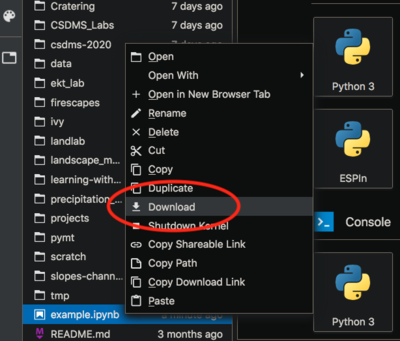JupyterHubUploadDownload: Difference between revisions
m Make headings |
Download a file |
||
| Line 7: | Line 7: | ||
= Download a file = | = Download a file = | ||
I have a file called <code>example.ipynb</code> on a JupyterHub. | |||
To download it to my local computer, I right-click on the file in the JupyterHub File Browser | |||
and select '''Download''', as shown in the figure below. | |||
[[File:hub-download-button.png | thumb | Figure 1. Right-click to download a file. | 400px]] | |||
= Upload a file = | = Upload a file = | ||
Revision as of 14:43, 26 April 2022
Uploading and downloading individual files from a JupyterHub is straightforward. The process for multiple files is trickier, though. We'll go over both cases here.
Download a file
I have a file called example.ipynb on a JupyterHub.
To download it to my local computer, I right-click on the file in the JupyterHub File Browser
and select Download, as shown in the figure below.

Upload a file
Upload a file. Show picture.
A problem and a solution
Problem: These menu buttons don't work for a directory of files. Solution: Group files in a directory and create a zip file. (Or a tarball, but zip works across platforms.)
Download a directory
First, an example of downloading a directory.
Open a terminal. Locate the directory you want to download. Zip it up. Use the download instructions above.
On you local machine you can either double click on the zip file in your file manager to uncompress it, or you can use unzip in a terminal.
Upload a directory
Second, an example of uploading a directory.
On your local machine, find the directory of files you'd like to upload. Zip the directory, either with the file manager or the zip command on a terminal. Use the upload instructions above. On the JupyterHub, open a terminal. Unzip the file.
Fin.
